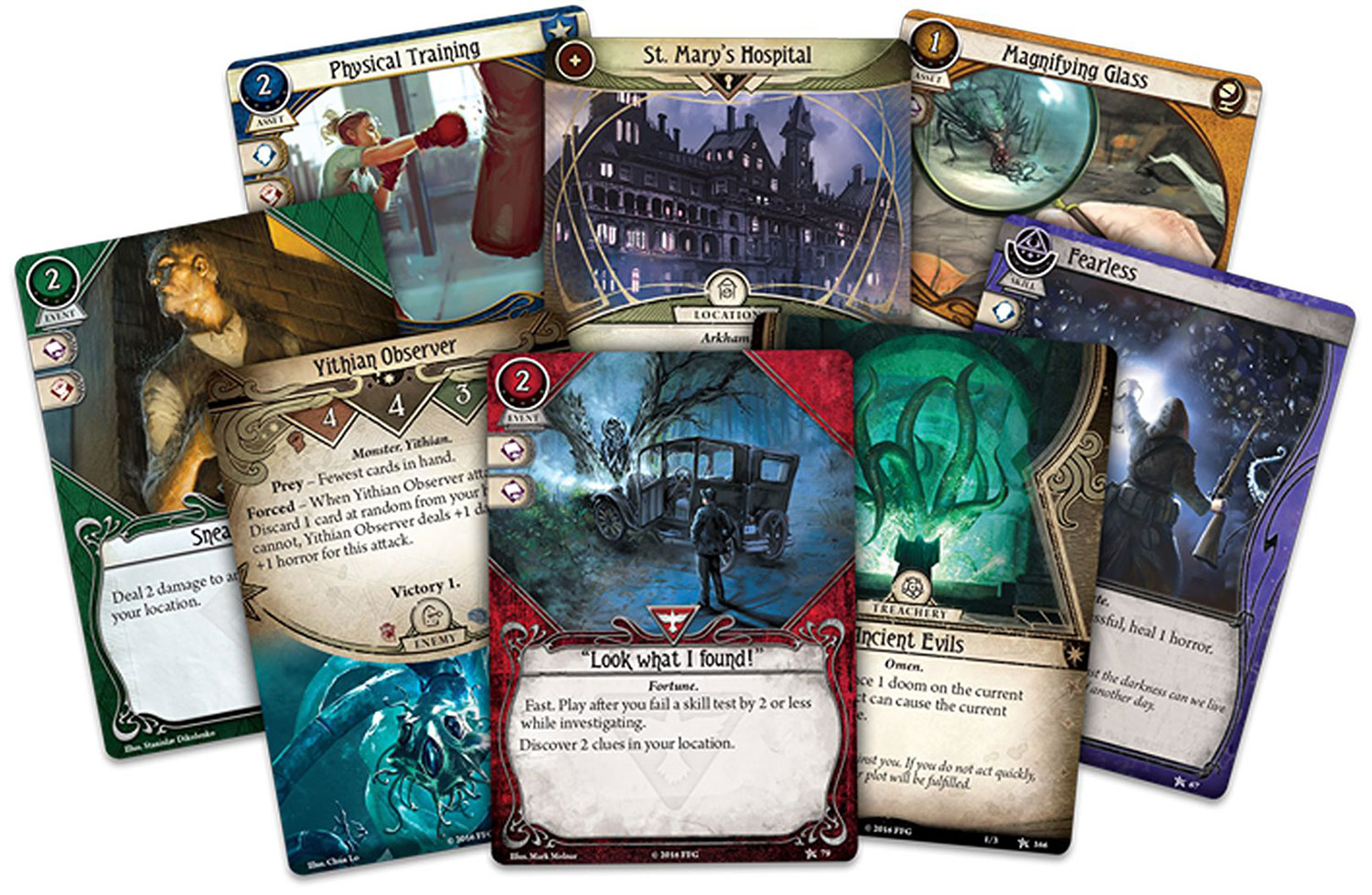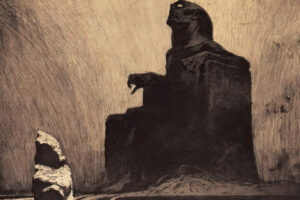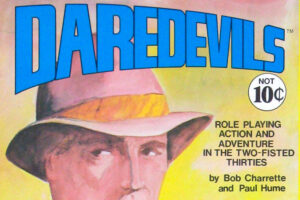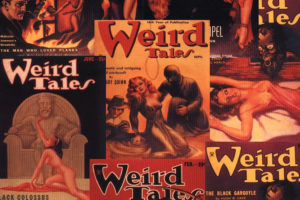They had a previous game, Call of Cthulhu: The Card Game, which was a collectible card game (CCG) at first, before being converted to FFG’s “living card game” (LCG) format, from 2004-2015. It thus has pretty much been replaced by AH: The Card Game, which came out in 2016 and is also a “living card game.”
So a little explanation of collectible and “living” card games: Most are probably familiar with decks of playing cards, which have 52 cards in four suits with either numbers or “face” cards. From this, you draw a hand of cards to play whatever particular game, be it poker, blackjack, go fish, or what have you.
In CCG/LCG, building your deck is an important part. You build this personal deck from an array of several hundred possible cards, which you may only have a fraction of, as you get additional cards from additional sets of cards. This personal deck is shuffled, and you draw your initial hand to play. This deck will have cards adding to your character’s base skills, knowledge, and materials to play the game. These cards may give things to your character, such as lockpicking skills, detective skills, or a flashlight, knife, or gun.
Now with CCGs, you begin with a starter deck of cards. To obtain additional cards with added skills and such, you need to buy booster packs. But these booster packs are random selections of cards of various levels of rarity. This means you may need to buy a lot of booster packs to get certain rare cards, and in the process get a lot of duplicate common cards. This rarity creates the collectibility of the cards and also creates a secondary market of people trading or buying and selling the harder to find cards.
LCGs are different as they eliminated the collectability aspect of these games. Each particular set of cards have an identical set of cards, so there is no rarities. You know exactly what you’re getting. LCGs are unique to Fantasy Flight Games.
With AH: TCG (you will sometimes see it referred to as Arkham Horror: Living Card Game or AH:LCG), you start with a core set. This core set have enought cards for up to two people to play, containing player and scenario cards. It’s recommended if you want three to four players you get a second set. The game can be played by one person. Players can select from five possible investigators and can build decks for two of them. The rest of the cards in the set provide the cards needed for the scenarios, containing locations, creatures and others that will be encountered. The base set has three scenarios that make up the “Night of the Zealot” campaign. Further, this game is a cooperative game where the players work together to solve scenarios, they don’t play against each other.
Be advised that a revised version of the core set is coming in October. It’s apparently not worth getting if you already play the game, but if you’re new to it, it may be worth waiting for it.
AH: TCG is built around the concept that the investigator(s) will play a certain adventure, or scenario. These can be standalone scenarios (there are about a dozen available), or a series of these are linked together into campaigns or cycles, of which there are six so far. These campaigns start with a “deluxe expansion” that have five new investigators and two scenarios. Then there are series of six linked scenario packs, each sold separately that finish out the campaign. They have since been adding “upgrade expansions” that have you “Return” to a particular campaign, and provide a nice card box to store the entire campaign. They even have one of these for the “Night of the Zealot” campaign in the base set. They also have a series of separate investigator packs as well.
However, it appears with an upcoming campaign expansion that this will be changing. With this expansion, which looks to be based on “The Mountains of Madness,” the investigator cards are available in one expansion, while the entire campaign is in another. No longer will there be a deluxe set followed by six separate scenario packs. And you aren’t required to get the investigator cards to play the campaign. Costwise, it’s cheaper this way. I have no idea if they will continue with the “Return” upgrades in this new scheme, tho I hope so, due to the card boxes being great storage.
As you purchase additional sets of cards, you add to your collection of possible player cards which may be used in building decks for your next campaign, as its unlikely that you initail investigator will make it through all your scenarios. Also, you need not play these campaigns in order, though they expect you to play the scenarios in order. And they do add little tweaks and additions to the game as your work through them. These campaigns are very different in style and focus. Some take you to Lovecratian locations like Innsmouth or Dunwich, or have you deal with the King in Yellow or Dreamland.
These scenarios are possible to be replayed. You can play them with a different investigator. There are five classes of investigaters, and each new campaign gives you five new ones you can play with other scenarios. Also, you can play the scenarios at one of four levels of difficulty. And some scenarios can be played with larger number of plays, in what is called “epic multiplayer” mode. Strangely, a single player isn’t supposed to play more than one investigator. Not sure why.
Also, both Arkham Horror and AH: The Card Game have several fiction works as well. The ones tied to the card game apparently include some additional cards. This isn’t as expansive as the fiction Chaosium has published, but I thought it was interesting this has also happened with Arkham Horror.
I’ve been slowly getting into this game, and am still working to understand it. It is a bit complex, especially in building decks, as well as understanding the gameplay. There are several videos on YouTube that can help you out.
FFG has another card game called Elder Sign that doesn’t seem to be as well supported with new scenarios that folks might want to check out.




